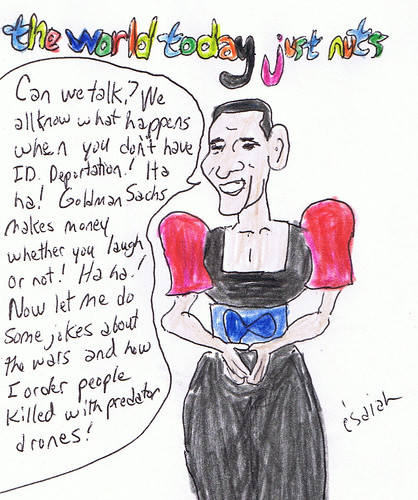BULLY BOY PRESS & CEDRIC'S BIG MIX -- THE KOOL-AID TABLE
AMERICA'S GROOVIEST RELIC FROM THE PAST, FADED CELEBRITY IN CHIEF BARRY O, THINKS GOING PUBLIC WITH HIS EATING DISORDER CAN GET HIM SYMPATHETIC PRESS SO HE FOLLOWED UP A BIG MEAL BY RUSHING TO A GROCERY STORE TO STOCK UP ON SWEETS AND OTHER THINGS.
THIS IS THE BINGE CYCLE.
THE PURGE FOLLOWS.
BARRY O IS CURRENTLY NEGOTIATING WITH SEVERAL TABLOIDS OVER HOW MUCH HE CAN GET FOR PHOTOS OF HIM HURLING INTO THE TOILET.
"WHEN PEOPLE KNOW I SUFFER FROM BULIMIA, THEY'LL LOVE ME ONCE AGAIN," BARRY O INSISTED TO THESE REPORTERS. "WHAT I REALLY NEED TO DO IS TO GET AMERICA TO FEEL SORRY FOR ME AND THEN THEY'LL FALL IN LOVE ALL OVER AGAIN."
Today's big news? The Peshmerga, elite Kurdish forces, entered Kirkuk this month to provide protection. Aslumaria reports KRG President Massoud Barzani declares that action is a form of Article 140 and the issue of who has the right to Kirkuk -- the KRG or the central government out of Baghdad -- has been decided with this action. Of Article 140, Chelsea J. Carter, Arwa Damon and Raja Razek (CNN) maintain, "However, the vote never took place because of instability in most of the disputed areas."
That's spin, that's not reality.
First, it wasn't just a vote. It was a census and a referendum.
Second, in October of 2010, Nouri was backing holding a census in Kirkuk at the start of December 2010. He only dropped that idea after The Erbil Agreement gave him a second term as prime minister. Shortly after that happened, he announced the census was being put 'on hold.' And, no, he did not give violence as a reason.
Of greater interest to us (and something's no one's reported on) is the RAND Corporation's report entitled "Managing Arab-Kurd Tensions in Northern Iraq After the Withdrawal of U.S. Troops." The 22-page report, authored by Larry Hanauer, Jeffrey Martini and Omar al-Shahery, markets "CBMs" -- "confidence-building measures" -- while arguing this is the answer. If it strikes you as dangerously simplistic and requiring the the Kurdish region exist in a vacuum where nothing else happens, you may have read the already read the report. CBMs may strike some as what the US military was engaged in after the Iraqi forces from the central government and the Kurdish peshmerga were constantly at one another's throats and the US military entered into a patrol program with the two where they acted as buffer or marriage counselor. (And the report admits CBMs are based on that.) Sunday Prashant Rao (AFP) reported US Col Michael Bowers has announced that, on August 1st, the US military will no longer be patrolling in northern Iraq with the Kurdish forces and forces controlled by Baghdad. That took years. And had outside actors. The authors acknowledge:
Continuing to contain Arab-Kurd tensions will require a neutral third-party arbitrator that can facilitate local CMBs, push for national-level negotiations, and prevent armed conflict between Iraqi and Kurdish troops. While U.S. civilian entities could help implement CMBs and mediate political talks, the continued presence of U.S. military forces within the disputed internal boundaries would be the most effective way to prevent violent conflict between Arabs and Kurds.
The issue should have been resolved long ago. Equally true, Nouri took an oath to uphold the Constitution in 2006. The Constitution said a census and referendum had to be held by the end of 2007. Nouri blew it off. In 2010, when his State of Law lost the elections, he refused to step down as prime minister and the US-brokered Erbil Agreement gave him a second term. The Kurds insisted that the contract include Nouri's promise that he would implement Article 140. He never did.
As tensions increase between Nouri and the Kurds, the editorial board of the Times of India looks at what it would mean for other nations if Iraq split into three self-governing sections (Shi'ite, Kurd and Sunni) and they conclude, "With Iraq's blundering PM Nouri al-Maliki refusing to accede to a national unity government, the US and Iran should work together to stabilise the region and deal with new sovereign entities that may emerge." AP reports Grand Ayatollah Ali al-Sistani has called on Iraq's political blocs to decide on a prime minister-designate before Tuesday's expected session of Parliament.
RT reports, "Jets from Russia and Belarus will hopefully make a key difference in the fight against ISIS in Iraq, the country’s Prime Minister Nouri Maliki said. He expressed regrets over Iraq's contract with the US, saying their jets are taking too long to arrive."
Yes, thug Nouri is complaining that he's been hampered in the tools he needs to attack the Iraqi people. The delay, for those who've forgotten, was to avoid allowing a despot to use them before the parliamentary elections. All Iraq News notes Nouri declares it a mistake to have "just bought US jets." A mistake by whom?
Alsumaria reports the UK has announced they will not participate militarily in Iraq. Unlikey the US which clearly does not fear angry voters the way the UK does. Today, UPI reports:
Pentagon spokesman Col. Steven Warren said, of the 500 American military personnel in Iraq, "Some of them are conducting an advise and assist mission, some are manning the joint operations center, some of them are part of the [Office of Security Cooperation] and yet others are Marines that are part of a [fleet anti-terrorism security team] platoon."
All Iraq News notes only 180 of the 500 are 'advisors' so 120 are still en route to make up Barack's 300 'advisors.'
RECOMMENDED: "Iraq snapshot"


